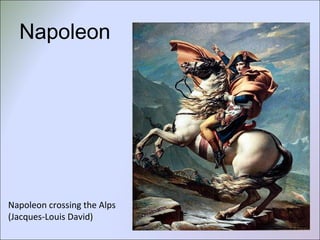Napoleon
- 1. Napoleon crossing the Alps (Jacques-Louis David) Napoleon
- 2. PHASES • French Consulate (1799-1804) • Consul for life (1802-1804) • The Empire (1804-1814) • Exile in Elba (1814-1815) • The Hundred Days (1815) • Exile in Saint Helena (1815-1821)
- 3. BIOGRAPHY • He was born in Corsica (1769). (He spoke Corsican language when he came to France) • His family was not wealthy and he was one of eight children • He went to the military school and became an officer. • He supported the revolution. • When he was 24 years old he became a general. • He was a very intelligent person, with leadership skills and a deep understanding of politics. • Very Ambitious.
- 4. • Almost all his brothers and sisters became kings, queens, or nobles: Joseph Bonaparte: King of Naples and later King of Spain Lucien Bonaparte: Minister of Interior and Ambassador Luois I: King of Holland Elisa Bonaparte: princess of Piombino and Lucca, then grand duchess of Tuscany Pauline Bonaparte: imperial French Princess and the Princess consort of Sulmona and Rossano. Caroline Bonaparte: Queen consort of Naples. Jérôme-Napoléon Bonaparte: French Prince, King of Westphalia
- 5. FRENCH CONSULATE (1799-1804) • He took part in the coup d’etat of Brumario. o He became “First Consul” (the most powerful man in France) • Political Measures: • Reorganized the Government • Centralized administration • Created new schools • Reorganized the country’s finances and tax system • Bank of France • New Legal System: The Napoleonic Code • He made peace with the Catholic Church (Concordat) • But freedom of speech and press was limited (strong censorship)
- 6. The Empire (1804-1814) • In 1804 Napoleon crowned himself emperor and France became an Empire.
- 7. Building an Empire • Main Victories: 1805→ Austerlitz; he defeated Austrians and Prussians 1806 → Jena; he defeated the Prussians 1807 → Friendland; he defeated the Russians Treaty of Tilsit with Russia and Prussia • Main Defeats: 1808 → Spanish Campaign (tremendous weakening). 1808, Battle of Bailen. 1812 →Campaign of Russia (450.000 people died)
- 8. He controlled almost all Europe • Direct Possessions: – Holland, Belgium, some States of Germany and Italy • Indirect Possesions: – Spain, Sweden, Duchy of Warsaw • Allied States: – Austro-Hungarian Empire – Prussia – Russian Empire
- 9. Main Adversaries • Only Britain remained undefeated • Great Rivalry between France and Britain • Napoleon tried to invade Great Britain: Disaster of Trafalgar -1805- (Nelson destroyed the French and the Spanish fleet) • Napoleon tried an economic blockade (he forbade the countries in his empire from trading with Britain) • Spain • Portugal • Russia • Sweden
- 11. The Fall of the Empire • It started with the defeats in Spain (1808) and in Russia (1812) • This encouraged the Sixth Coalition: Austria, Prussia, Russia, Great Britain, Portugal, Spain, Sweden • Battle of Leipzig (1813) (90.000 casualties) • March 1814: Paris was captured by the Coalition • Napoleon abdicated (1814)
- 12. • Exile to Elba (April 1814 – February 1815) • The Hundred Days (March 1815) – He came back to France – The battle of Waterloo (June 1815) • Exile to Saint Helen (1815-1821)
- 13. The main achievements • He consolidated the revolution in France. • He spread the revolutionary ideas through Europe – Suppression of the Privileges of Nobles – Establishment of Liberty and Equality – Birth of Nationalism
- 14. Duke of Wellington Napoleon Bonaparte
Editor's Notes
- Notas
